Prevalence of Hospital Infections
CDC data on hospital infections shows that:
- On any given day, about one in 25 hospital patients has at least one healthcare-associated infection (HAI).
- Every year there are more than 700,000 HAIs in U.S. acute-care hospitals and about 75,000 patients with HAIs die during their hospitalizations.
Progress in Decreasing Hospital Infections
Research indicates that when healthcare facilities, care teams, and individual practitioners (and we’d argue to add patients, families, and advocates) are aware of infection problems and take specific steps to prevent them, rates of HAIs can decrease by more than 70 percent. A CDC report which compared rates of infections between 2011 and 2014 showed a decrease in many types of infections following new regulations and programs.
Fortunately, hospitals are now required to report infection rates and are penalized with reduced Medicare payments for high rates. You can view Medicare’s Hospital Compare for hospital data, including infection rates.
Patient Safety Tips for Preventing Hospital Infections
What can you do to stay safe? The CDC recommends six important steps for patient safety, which we further elaborate on below:
Speak up. This is where having an advocate at the hospital is so important. Someone else often has to keep an eye on these issues for patients who are too ill to do so. Family members should ask the doctors and nurses about what to watch for. Our care managers visit their clients regularly at the hospital to troubleshoot potential issues like this. We may notice some changes in you that indicate a possible infection (knowing our clients and focusing solely on you, we can often spot things first) and we sometimes observe some gaps in infection-control measures which need to be corrected. Speaking up includes asking about procedures and care plans, to make informed medical decisions. Some procedures come with infection risks (and some people are at higher risk such as those with multiple medical conditions, diabetics, obese patients and smokers); it’s important to understand all risks and benefits.
Clean hands and infection-control for supplies. Hospital staff are generally well-trained about this issue (but occasionally slip up) but visitors also need to be educated. No one should visit you when they have even a minor illness and everyone should wash their hands before entering and leaving your room (watch this video on the proper technique). Staff should always use gloves when drawing blood or doing any procedure on you–and often should change gloves when working on different areas of your body, especially if there’s an infection present. Here’s a video on the proper way to take off gloves to avoid contamination. Infection control is also very important for the equipment and supplies being used on you, to avoid cross-contamination. Hospitals also do many things within the environment to help control infections, such as isolation procedures, specialized cleaning and air ventilation. Be informed about how well they are following protocols by checking out their rates online, especially when factoring which facility might be best for your needs.
Wise use of antibiotics. Check with your doctor about any antibiotics being prescribed to make sure they are necessary and best suited to your condition. Overuse of antibiotics has led to powerful, antibiotic-resistant bacteria (“super bugs”). Of course, when used properly antibiotics can be a life saver.
Infection awareness. Your advocates play a vital role in awareness and monitoring. If you or your loved one notices something unusual, bring it to the providers’ attention. Make sure staff is monitoring your surgical sites, dressings, drainage tubes, ports, catheters, etc. Confusion and sudden changes in mental status often indicate some underlying medical problem, such as an infection. Staff may be less aware of these changes if they do not know the patient well, so family and/or the care manager may be the ones to bring these to their attention.
Watch for gastrointestinal symptoms. C. difficile (Clostridium difficile or C.diff) can be deadly; it tends to affect patients in hospitals and long-term care facilities who have conditions requiring frequent or high dose antibiotics (which kill off the good bacteria that normally help keep your system’s microorganisms in balance). Your medical professionals can best help you when they’re thoroughly informed. Let them know of any changes and ask questions if something doesn’t feel right.
Get vaccinated. Talk to your doctor to make sure you’re updated on vaccinations, especially before entering the hospital or a skilled nursing facility.
This information also applies to other healthcare settings such as dialysis centers, long-term care/skilled nursing facilities, outpatient clinics and surgery centers. When deciding on a skilled nursing facility, you can view their state inspection report as well as check out Medicare’s comparison to see their measures on a variety of factors including infection control.
Get help from our Aging Life Care Managers with patient advocacy, ER and hospital care management, and coordination of medical services from choosing the right provider through ensuring the best outcomes.

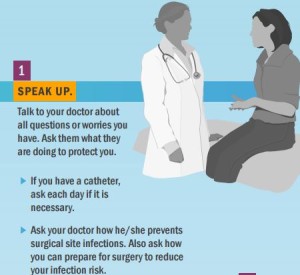
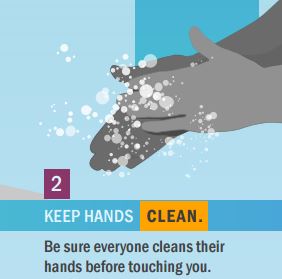

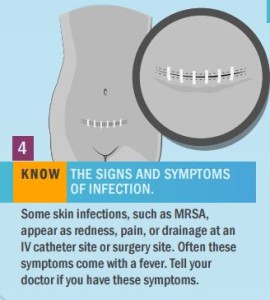
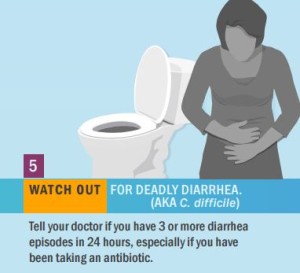
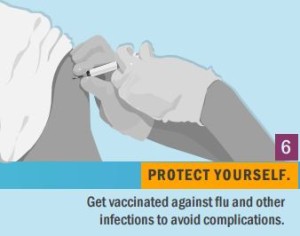
 Popular Downloads
Popular Downloads


 Get Our Newsletter!
Get Our Newsletter! Mission Statement
Mission Statement

